Health and Community
Minnie Vance
Sixty Years of Open-Door Healthcare
By Katherine Vance
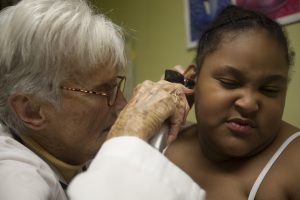
Minnie, at the time 87 years old, looks at a patients ears at her office on McCallie Ave. Photo by Katherine Vance.
When I was asked to write a 500 word feature about my grandmother, Dr. Minnie Vance, I admit that I almost turned the assignment down. I was incredibly intimated. How could I possibly fit the story of her more than half a century’s work as a pediatrician in Chattanooga, TN?
Perhaps I should start in Austin, Texas. In 1932, Minnie was a ten-year-old tom-boy, running around barefoot during a hot, sticky summer. When she wasn’t playing in the Texas heat, she read in the big, old wicker chair in her family’s living room. When she was ten, she read a book about nurses, which helped her realize that she wanted to use her life to help others. Yet, this wiry little girl didn’t stop there. Despite the traditional gender roles of the 1930’s, Minnie remembers thinking, “Why be a nurse? Nurses have to empty bedpans. I don’t want to empty ‘ole bedpans. Why not be a doctor?”
Fast forward to 1945. Minnie, at 23, started her first year at the University of Tennessee’s Medical School in Memphis. A tall, striking blond, she was the only woman in her class, and remained so for the first few years.
Minnie claimed she was isolated by some of her male classmates; some found her career decision unconventional. But Minnie never flinched.
“I never thought it was weird,” she said. “I always believed that I could be what I wanted to be.”
In 1950, Minnie married Daniel Vance of Chattanooga. After finishing her residency in 1952, she opened a pediatric office in the city in a small house at 2507 McCallie Ave. That little house would serve as her office for 58 years.
Minnie continued to live a life that was certainly unconventional, and, in my slightly biased opinion, revolutionary. With four children, she balanced life as a doctor with life as a mother; Working, professional, mothers were not as common during ‘50s and ‘60s as they are today.
A friend of Minnie’s, Dr. Eleanor Stafford, became a partner at the office in 1954, and the two women gained a reputation for treating underprivileged children. Their initial charge for an office visit was about $3, but if a parent couldn’t afford it, the doctors would see their children anyway.
“We could never turn away a child,” Minnie said. “Children from the lower end of the socio-economic spectrum needed good doctors, too.”
The two women maintained this mentality throughout their years of practicing medicine. Often taking patients that other doctors would not. Before the civil-rights bill passed, Minnie and Eleanor’s office had one of the few non-segregated waiting rooms in Chattanooga.
“We could never do that to a human being,” Minnie says, “I was brought up by my parents to be open-minded and loving towards all people, to believe that we are all children of God.”
Minnie was 30 years old when she opened the McCallie Ave office and did not retire until the fall of 2010, at the age of 88. She saw tens of thousands of patients over the years, and often multiple generations within families.
Dr. Minnie Vance has touched the lives of so many people. She is truly a great woman of Texas, of Appalachia, of the world.
Marie Cirillo and Carol Judy
Keeping the Land in the Hands of the People
Written by Jillian Randel
In the Eagan Tenn., community, two women strive tirelessly to promote community development. Carol Judy and Marie Cirillo have worked with the Clearfork Community Institute and the Woodland Community Land Trust to purchase land for community members who would otherwise be left without.
The land trusts allow residents to enter into lifetime renewable leases where they can build homes and businesses, grow gardens, plan community meals and foster a sense of belonging and participation. Judy and Cirillo work to keep the land in the people’s hands, rather than for-profit private and corporate owners.
Cirillo, a former nun, keeps a smile on her face and positive energy everywhere she goes. Judy is a good-humored root-digging herbalist passionate about the mountains. Both women have dedicated their lives to creating positive community development.
Kit Gruille
Turning Domestic Violence Victims into Survivors
Written by Linda Coutant
Kit Gruelle has been a professional advocate for battered women in North Carolina for 25 years, helping them tap into their unrealized strengths. “It’s almost a form of midwifery – you get to be a part of the birthing process,” said Gruelle, who lives in Wilkes County.
She has lectured throughout the United States as a community educator to law enforcement, clergy and health care professionals. She breaks the stereotypes regarding domestic violence in her educational film, Private Violence, which is being made into a feature-length documentary with support from Gloria Steinem and Crazy Love author Leslie Morgan Steiner. Gruelle is working on a sociology degree at Appalachian State University, with possible plans to attend law school to better support domestic violence reform.
Blue Ridge Women in Agriculture
Emphasizing a Vibrant Local Food System
Written by Jamie Goodman
In 2005, a group of women farmers in northwestern North Carolina, frustrated by the lack of resources and skepticism often shown to female agriculturalists, came together to create a support system for each other— a network which would become known as Blue Ridge Women in Agriculture (BRWIA). Over the past seven years, the all-volunteer group has accumulated a directory of more than 60 female farmers in a tri-county region.
All donation and grant money is applied directly to BRWIA’s various programs, helping women attend regional and national farming conferences and offering well-attended community workshops each month (open to both men and women) on topics such as chicken processing, bread making and policy (including last year’s Farm Bill).
Their third annual Farm Tour, held last August, featured seventeen farms and hosted more than 250 visitors; participating farms included a goat dairy, a blueberry orchard, and a horse rehab center. This year BRWIA will begin offering a $1,500 Sustainable Food and Agriculture Grant (deadline March 1) to women farmers in their region, supporting innovation in sustainable agriculture. While focusing mostly on the needs of women farmers, the organization’s ultimate goal, says Mel Weiss, AmeriCorps Vista Program Coordinator for BRWIA, is to create “a strong and vibrant food system, which is inclusive.”
BRWIA will host a Winter Gathering at Hob Knob Farm Cafe in Boone, N.C., on February 21 from 4-6 p.m. for the community to meet the members and learn about the group’s work. For more information visit brwia.org.
Appalachian Women’s Alliance
Celebrating and Strengthening Appalachian Women
By Anna Oakes
Since the heyday of the railroads and coal companies, when black Appalachians settled in the coalfields of southwestern Virginia, the black and white “camps” of Clinchco remained separated—until the late 1990s, when local groups organized by the Appalachian Women’s Alliance planned a diversity workshop and rally that drew threats from the Ku Klux Klan.
The Appalachian Women’s Alliance, headquartered in Floyd, Va., was founded in 1993 by a group of women organizers throughout the region. Striving for economic justice, human rights and safety for women and children, they work to preserve the Appalachian mountains, culture and communities.
The alliance resolved to end racism in Dickenson County, holding black history celebrations, placing black history books in schools and libraries and opening the Clinchco Center in 2004. The center is a resource for education, civic involvement, creative expression and social interaction.
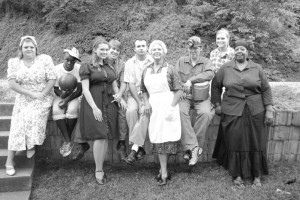
The cast of a play presented by the Clinchco Center included Edna Gulley (far right), a full-time staff member at the center and member of the Appalachian Women's Alliance. Photo by Julia Powers, courtesy of the Clinchco Center.
“Since that time, we’ve involved hundreds of women in our programs,” said Meredith Dean, director of the alliance.
Edna Gulley is a Clinchco resident and full-time staff member at the center. Gulley said she is proud to work with low-income women in her community, helping them realize that they do have a voice.
“It’s work that makes you feel good,” Gulley said. “If I wasn’t getting paid, I would still be a part of this organization. Coming into the alliance has made a tremendous impact on my life…getting out and meeting and greeting different people.”
The alliance has published the Appalachian Women’s Journal, encouraging Appalachian women to speak to each other and the world in their own words.
“Mountain Women Rising”— a traveling performance presentation that shares women’s experiences through poetry, prose and song— was designed to be tailored to classes in social studies, women’s studies and Appalachian studies and supplemented with workshops.
The alliance also sponsors Ironweed, a gathering that celebrates the artistic talent, regional leadership and courageous lives of Appalachian women through music, storytelling, poetry, dance and visual arts.
“I do thank the alliance for coming together and saying, ‘how can we bridge this community so it can be one community?’” Gulley added. “It’s a community—it’s not either or.”
For more info about the Appalachian Women’s Alliance, click to www.appalachianwomen.org or email awa@swva.net.
Appalachian Women’s Fund
Picking Up Where Crisis Centers Leave Off
Written by Parker Stevens
In Watauga County, N.C., there are a number of agencies that help women in crisis situations, but once they are out of immediate danger, what comes next?
Appalachian Women’s Fund (AWF) works in collaboration with organizations in the High Country to provide services and educational opportunities that help women transition from crisis situations towards safety, stability and independence.
Run by an all female volunteer board, AWF has raised and granted over $180,000 to programs in seven N.C. counties that provide women with the skills and confidence they need to improve their future.
“We are all very proud of the work we do empowering women” says Cathy Williamson, AWF board member. “We are providing opportunities to impoverished, disenfranchised women and empowering them to break out of that cycle.”
AWF focuses on programs that give women the tools – including professional training, education, and financial skills – they need to become self-sufficient.
Teresa Gardner and Paula Hill Meade, Health Wagon
Mission work in your own back yard
Written by Hannah Morgan
Best friends since 8th grade, Teresa Gardner and Paula Hill Meade have drawn even closer through their work together at the Health Wagon in Clinchco, Va.
As Nurse Practitioners, the two women serve communities in Dickenson and Wise Counties year round offering free health care to people who could not otherwise afford these services. A mobile clinic drives to remote areas of Dickenson County and every July, the Health Wagon hosts the Remote Area Medical clinic (known as RAM) in Wise, Va., serving over a thousand patients in one weekend.
Inspired by Sr. Bernie Kenny, founder of the Health Wagon, the two women have dedicated their lives to serving those in need in their community. As Meade says, “my philosophy has always been that the only way to find yourself is to lose yourself in serving others.”
Related Articles
Latest News

Leave a comment
Your email address will not be published. Required fields are marked *
One response to “Health and Community”
-
The first posting about Minnie Vance and the wonderful work that she has done to serve the underprivileged is a true picture of what it means to “serve the community”. If we have more Dr.’s doing the “serving” that our communities need, we can begin to repair the health of our communities.


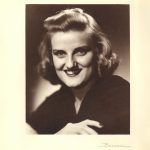
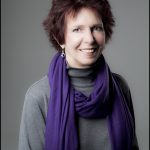

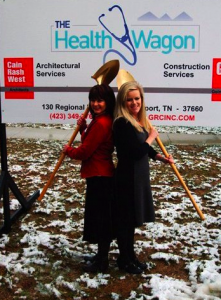



Leave a Comment